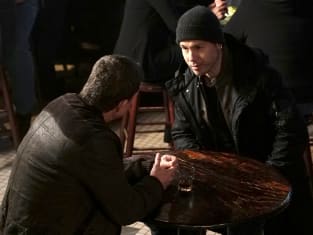Chicago Justice Season 1 Episode 12 Review: Fool Me Twice
 Jack Ori
at
.
Updated at
.
Jack Ori
at
.
Updated at
.
In real life, cops who kill suspects very often get off without any jail time.
That's why I expected a guilty verdict on Chicago Justice Season 1 Episode 12.
Television provides an alternate universe where things happen the way people wish they would so often that I took it for granted. That's what made the surprise ending of "Fool Me Twice" so powerful.
It was pretty obvious early in the hour that Banks and Kim were doing something they weren't supposed to, but I wasn't expecting this story to be about jaded cops who saw accused murderers and gang members as less than human.
I thought the show might go in the direction of forgetting the original case in order to re-open the investigation into Bobby Burrows and his 15-year-old sex partner, as often happens when random other crimes are discovered in the course of this kind of story.
I was glad that didn't happen because when it does, it always leaves me wondering about the outcome of the original case.
Laura: I'm sorry I got you into this.
Eric: You didn't get me into anything. You kept me out of jail.
Laura: And I put a target on your back.
Instead, Chicago Justice put the whole practice of using confidential informants on trial, along with questions of when and how cops cross the line when dealing with violent offenders day in and day out.
Issues related to the way the department treats confidential informants came up over and over. Laura had to talk Stone into taking any interest in her informant's case while O'Doyle blew his cover on the stand and implied that the deal he'd made was immoral.
Laura: CIs are good folks. They risk their lives for us.
Stone: Yeah, and in exchange they stay out of prison.
Laura: So we're supposed to turn our backs on them?
Stone's attitude that Eric's case didn't deserve attention because he avoided jail due to becoming an informant wasn't that far off from Banks' assertion that certain suspects were "garbage." In both cases, the underlying theme seemed to be that if you break the law, you deserve what you get, including murder.
Meanwhile, Eric went from being appreciative that Laura kept him out of jail by allowing him to become an informant to regretting making that choice.
He left the courtroom in more danger than he was in when he'd walked in because the general public now knew he was an informant and the person who tried to kill him walked despite plenty of evidence of guilt.
O'Boyle: We do our dances in the courtroom, but that's all it is. But Banks, he puts on a badge and maybe he lives but maybe he dies by the law.
Stone: So you're saying he can kill with impunity?
O'Boyle: Of course not. But this broken system we're dancing around in, I'm not sure it's prepared to find him guilty for it.
The system that forces convicted criminals to choose between jail (which is often a dangerous environment in its own right) and risking their lives by informing the cops about other criminal activity is broken indeed.
While it wasn't addressed overtly, it seemed like Eric was yet another casualty of the war on drugs, caught engaging in criminal activity related to his drug habit and then put in a position where he took far too much risk for a relatively low-level crime.
I'd have loved to have known more about how Laura convinced him to become an informant and whether she used her relationship with him to get him to do it.
This experience probably destroyed their friendship, but Eric clearly was close to Laura before this and I wanted to know more. I was also curious about how much guilt she might carry over this whole thing later on.
O'Doyle is always an interesting character. I think he's my favorite of the recurring set of defense attorneys.
I can never tell if he believes anything he's saying. To him, it's always just a game where he tries to best Peter in the courtroom before sharing a drink at the bar. He's the lawyer I'd want on my side if I were facing criminal charges because his cynicism allows him to be an incredibly aggressive advocate.
His argument against admitting the tape of the cops going after Eric was interesting. The judge dismissed it out of hand, saying there was no Fourth Amendment violation here, but didn't explain why.
I'd guess that there's no expectation of privacy in a government-owned police car and that the cops probably signed paperwork to the effect that they understood their interactions in their vehicle might be recorded, but I'd have liked this to be made explicit.
I was glad that the judge ruled against O'Doyle here, though, because his argument seemed to be circular. Cops don't have an expectation of privacy, but cops can't be criminals so therefore since they were arrested their expectation of privacy should be restored.
Antonio: We know about the orange Olds.
Jerry: It was a Chevy.
Laura: And you said it was red.
Antonio: Look, we know about the trouble Bobby got into.
Jerry: It was a mistake! Bobby didn't know that girl was 15.
Antonio: Officers Banks and Kim helped him out of that jam, but you don't owe them anything.
Laura: If you stick to your story about a red Chevy, an innocent person could go to jail.
Jerry: I know what I saw. We're done here.
Banks and Kim's list of crimes was lengthy. They'd tampered with evidence and accepted money in exchange for committing at least four murders. I wasn't sure why Stone seemed to focus only on the attack on Eric in making his case.
I'm sure the writers thought it was more dramatic that way, but the other murders were only mentioned in passing, making it unsurprising that the jury found Banks innocent of them.
Plus, focusing only on Eric's attack supported the cops' contention that the other murder victims were "garbage" that would have killed someone eventually and thus their lives didn't matter.
I found this argument disturbing. Banks and Kim clearly thought they were doing the right thing, and probably seeing some of the violence they saw regularly contributed to their feeling that it was better just to take these guys out before they took someone else out.
I don't know what the solution is to extreme gang violence, but letting cops kill drug dealers instead of arresting them isn't it. Stone was right that this was a bad road to go down and that it opened the door for any cop to kill anyone who they suspected of being involved in something nefarious.
So why didn't he win at trial?
He had facts on his side, and when he played the tape of Eric's shooting for the jury, everyone flinched. Yet he failed to get even one guilty verdict for Banks out of the four shootings he was accused of.
It seemed like O'Doyle was right that juries are reluctant to convict cops, especially those who have put their lives on the line for years to put away bad guys. He painted a convincing picture of Banks as a heroic cop who was just doing his job by taking out the scum that threatens people.
In doing that, he appealed to people's fears that Chicago is an inherently dangerous place and that they could be the next victims of gun violence if the cops didn't cross the line to keep them safe.
Perhaps if Stone had driven home the point harder that allowing cops to become vigilantes who kill with impunity makes people less safe, not more, he might have got somewhere.
In any case, I found it disturbing that Kim ended up cutting a deal that got him a life sentence while his partner walked when they were equally guilty.
There are a lot of reasons that happened. Kim's desire to protect his family was his main motivation for cutting a deal, and Banks didn't seem to have any such concerns.
Even so, it certainly didn't seem like justice for Kim to do enough time for both of them while Banks got off scot-free, and I'm sure I'm not the only viewer who noticed that the Asian cop did a life sentence while the white one walked.
What did you think of "Fool Me Twice?" Were you surprised by the jury's verdict? Do you think O'Doyle believed a word he said in the courtroom?
Weigh in below, and don't forget that if you missed anything you can watch Chicago Justice online.
Jack Ori is a senior staff writer for TV Fanatic. His debut young adult novel, Reinventing Hannah, is available on Amazon. Follow him on X.






